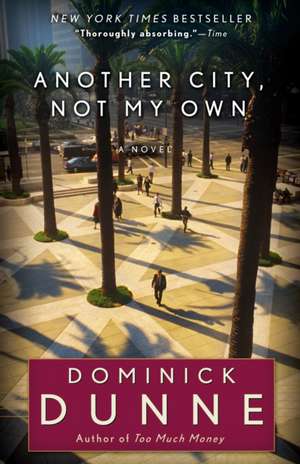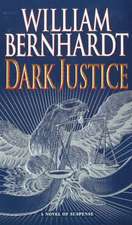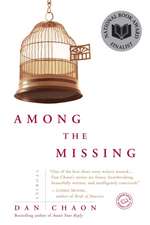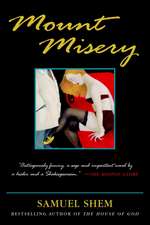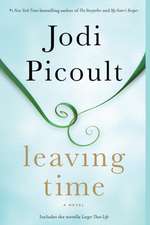Another City, Not My Own
Autor Dominick Dunneen Limba Engleză Paperback – 31 oct 2009
Preț: 108.09 lei
Nou
Puncte Express: 162
Preț estimativ în valută:
20.69€ • 21.52$ • 17.08£
20.69€ • 21.52$ • 17.08£
Carte disponibilă
Livrare economică 24 martie-07 aprilie
Preluare comenzi: 021 569.72.76
Specificații
ISBN-13: 9780345522191
ISBN-10: 0345522192
Pagini: 360
Dimensiuni: 133 x 203 x 20 mm
Greutate: 0.26 kg
Editura: BALLANTINE BOOKS
ISBN-10: 0345522192
Pagini: 360
Dimensiuni: 133 x 203 x 20 mm
Greutate: 0.26 kg
Editura: BALLANTINE BOOKS
Notă biografică
Dominick Dunne, who spent three years covering the trials of O.J. Simpson, is an internationally acclaimed journalist and the best-selling author of both fiction and nonfiction, including A Season in Purgatory, An Inconvenient Woman, The Two Mrs. Grenvilles, People Like Us, and The Mansions of Limbo.
From the Hardcover edition.
From the Hardcover edition.
Extras
Yes, yes, it's true. The conscientious reporter sets aside his personal views when reporting events and tries to emulate the detachment of a camera lens, all opinions held in harness, but the man with whom this narrative deals did not adhere to this dictum, at least when it came to the subject of murder, a subject with which he had had a personal involvement in the past. Consequently, his reportage was rebuked in certain quarters of both the journalistic and the legal professions, which was a matter of indifference to him. He never hesitated to speak up and point out, in print or on television, that his reportage on matters of murder was cheered by much larger numbers in other quarters. "Walk down Madison Avenue with me and see for yourself how often I am stopped by total strangers," he said in reply to a hate letter he received from an enraged man who wrote that he had vilified O.J. Simpson "through the pages of your pretentious magazine for two and a half years."
His name, as it appeared in print or when he was introduced on television, was Augustus Bailey, but he was known to his friends, and even to those who disliked him intensely, because of the way he had written about them, as Gus, or Gus Bailey. His name appeared frequently in the newspapers. His lectures were sold out. He was asked to deliver eulogies at important funerals or to introduce speakers at public events in hotel ballrooms. He knew the kind of people who said "We'll send our plane" when they invited him for weekends in distant places.
From the beginning, you have to understand this about Gus Bailey: He knew what was going to happen before it happened. His premonitions had far less to do with fact than with his inner feelings, on which he had learned to rely greatly in the last half dozen years of his life. He said over the telephone to his younger son, Zander, the son who was lost in a mountain-climbing mishap during the double murder trial of Orenthal James Simpson, "I don't know why, but I keep having this feeling that something untoward is going to happen to me."
Certainly, there are enough references to his obliteration in his journal in the months before he was found dead in the media room of his country house in Prud'homme, Connecticut, where he had been watching the miniseries of one of his novels, A Season in Purgatory. The book was about a rich young man who got away with murder because of the influence of his prominent and powerful father. Getting away with murder was a relentless theme of Gus Bailey's. He was pitiless in his journalistic and novelistic pursuit of those who did, as well as of those in the legal profession who created the false defenses that often set their clients free. That book, the miniseries of which he was watching, had brought Gus Bailey and the unsolved murder in Greenwich, Connecticut, which, to avoid a libel suit, he had renamed Scarborough Hill, a great deal of notoriety at the time of its publication, resulting in the reopening of the murder case by the police. Gus had fervently believed that the case remained unsolved because the police had been intimidated by the power and wealth of the killer's family, which extended all the way to the highest office in the land.
"It was exactly the same thing in the Woodward case," said Gus, who had written an earlier novel about a famous society shooting in the aristocratic Woodward family on Long Island in the fifties called The Two Mrs. Grenvilles. "The police were simply outdazzled by the grandeur of Elsie, whom I called Alice Grenville, and Ann Woodward got away with shooting her husband."
As always, when Gus's passions were involved in his writing, he ruffled feathers. Powerful families became upset with him. He created enemies.
"You seem to have annoyed a great many very important people," said Gillian Greenwood of the BBC, as a statement not a question, in the living room of Gus Bailey's New York penthouse, where she was interviewing him on camera for a documentary on his life called The Trials of Augustus Bailey.
Gus, who was used to being on camera, nodded agreement with her statement. "True," he replied.
"Do people ever dislike you, the way you write about them?" asked Gillian, who was producing and directing the documentary.
"There seems to be a long line," answered Gus.
"Does that bother you?" she asked.
"It's an occupational hazard, I suppose," said Gus.
"Does it bother you?" Gillian repeated.
"Sometimes yes. It depends who, really. Do I care that a killer or a rapist dislikes me? Or the lawyers who get them acquitted? Of course not. Some of those people, like Leslie Abramson, I am proud to be disliked by."
"Yes, yes, Leslie Abramson," said Gillian. "She told us you weren't in her league when we interviewed her for this documentary."
Gus, who was a lapsed Catholic, looked heavenward as he replied, "Thank you, God, that I am not in Leslie Abramson's league."
"What happens when you meet these people you write about? You must run into some of them, the way you go out so much, and the circles you travel in."
"It does happen. It's not uncommon. Mostly, it's very civilized. Averted eyes, that sort of thing. A fashionable lady in New York, Mrs. de la Renta, turned her back on me at dinner one night and spoke not a word in my direction for the hour and a half we were sitting on gold chairs in Chessy Rayner's dining room. I rather enjoyed that. Sometimes it's not quite so civilized, and there have been a few minor skirmishes in public."
"That's what I want to hear about," said Gillian.
Gus laughed. "I seem to have annoyed a rather select number of your countrymen when I wrote in Vanity Fair magazine that I believed the British aristocrat Lord Lucan, who murdered his children's nanny in the mistaken belief that she was his wife and then vanished off the face of the earth, was alive and well and being supported in exile by a group of very rich men who enjoyed the sport of harboring a killer from the law. Certain of those men were very annoyed with me."
"Oh, let me guess," said Gillian. "You annoyed the all-powerful James Goldsmith, and he's very litigious."
"Curiously enough, not Jimmy Goldsmith, who had every reason to be annoyed," said Gus. "He chose to treat the whole thing as a tremendous joke. 'Gus here thinks Lucky Lucan is hiding out at my place in Mexico,' he said one night at a party at Wendy Stark's in Hollywood, which we both attended, and everyone roared with laughter at such an absurdity."
"Who, then?" persisted Gillian.
"Selim Zilkha, a very rich Iraqi who used to live in London, had dinner with Lucky Lucan the night before the murder, which I wrote about. Now he lives in Bel Air. He made a public fuss about me at the opening night of Sunset Boulevard in Los Angeles, when he chastised one of his guests, the Countess of Dudley, who was visiting from London, for greeting me with a kiss on each cheek. He referred to me by a four-letter word beginning with s that I can't say on television."
"What happened?"
"The countess, who was no stranger to controversy herself, told off Zilkha in no uncertain terms," said Gus.
"She said she'd kiss whomever she wanted to kiss and, furthermore, 'Gus Bailey is an old friend of many years.'"
"Tell me more."
"Another Lucan instance happened in your country," said Gus. "Another of the men I mentioned, John Aspinall, a rich guy who owned the gambling club above Annabel's where Lord Lucan was a shill, made a terrible fuss at a Rothschild dance in London. He wanted Evelyn to throw me out."
"Were you thrown out?"
"Of course not. The way I look at it is this: If Lucan is dead, as they all claim, why don't they just laugh me off as a quack? Why do I enrage them so?"
From the Hardcover edition.
His name, as it appeared in print or when he was introduced on television, was Augustus Bailey, but he was known to his friends, and even to those who disliked him intensely, because of the way he had written about them, as Gus, or Gus Bailey. His name appeared frequently in the newspapers. His lectures were sold out. He was asked to deliver eulogies at important funerals or to introduce speakers at public events in hotel ballrooms. He knew the kind of people who said "We'll send our plane" when they invited him for weekends in distant places.
From the beginning, you have to understand this about Gus Bailey: He knew what was going to happen before it happened. His premonitions had far less to do with fact than with his inner feelings, on which he had learned to rely greatly in the last half dozen years of his life. He said over the telephone to his younger son, Zander, the son who was lost in a mountain-climbing mishap during the double murder trial of Orenthal James Simpson, "I don't know why, but I keep having this feeling that something untoward is going to happen to me."
Certainly, there are enough references to his obliteration in his journal in the months before he was found dead in the media room of his country house in Prud'homme, Connecticut, where he had been watching the miniseries of one of his novels, A Season in Purgatory. The book was about a rich young man who got away with murder because of the influence of his prominent and powerful father. Getting away with murder was a relentless theme of Gus Bailey's. He was pitiless in his journalistic and novelistic pursuit of those who did, as well as of those in the legal profession who created the false defenses that often set their clients free. That book, the miniseries of which he was watching, had brought Gus Bailey and the unsolved murder in Greenwich, Connecticut, which, to avoid a libel suit, he had renamed Scarborough Hill, a great deal of notoriety at the time of its publication, resulting in the reopening of the murder case by the police. Gus had fervently believed that the case remained unsolved because the police had been intimidated by the power and wealth of the killer's family, which extended all the way to the highest office in the land.
"It was exactly the same thing in the Woodward case," said Gus, who had written an earlier novel about a famous society shooting in the aristocratic Woodward family on Long Island in the fifties called The Two Mrs. Grenvilles. "The police were simply outdazzled by the grandeur of Elsie, whom I called Alice Grenville, and Ann Woodward got away with shooting her husband."
As always, when Gus's passions were involved in his writing, he ruffled feathers. Powerful families became upset with him. He created enemies.
"You seem to have annoyed a great many very important people," said Gillian Greenwood of the BBC, as a statement not a question, in the living room of Gus Bailey's New York penthouse, where she was interviewing him on camera for a documentary on his life called The Trials of Augustus Bailey.
Gus, who was used to being on camera, nodded agreement with her statement. "True," he replied.
"Do people ever dislike you, the way you write about them?" asked Gillian, who was producing and directing the documentary.
"There seems to be a long line," answered Gus.
"Does that bother you?" she asked.
"It's an occupational hazard, I suppose," said Gus.
"Does it bother you?" Gillian repeated.
"Sometimes yes. It depends who, really. Do I care that a killer or a rapist dislikes me? Or the lawyers who get them acquitted? Of course not. Some of those people, like Leslie Abramson, I am proud to be disliked by."
"Yes, yes, Leslie Abramson," said Gillian. "She told us you weren't in her league when we interviewed her for this documentary."
Gus, who was a lapsed Catholic, looked heavenward as he replied, "Thank you, God, that I am not in Leslie Abramson's league."
"What happens when you meet these people you write about? You must run into some of them, the way you go out so much, and the circles you travel in."
"It does happen. It's not uncommon. Mostly, it's very civilized. Averted eyes, that sort of thing. A fashionable lady in New York, Mrs. de la Renta, turned her back on me at dinner one night and spoke not a word in my direction for the hour and a half we were sitting on gold chairs in Chessy Rayner's dining room. I rather enjoyed that. Sometimes it's not quite so civilized, and there have been a few minor skirmishes in public."
"That's what I want to hear about," said Gillian.
Gus laughed. "I seem to have annoyed a rather select number of your countrymen when I wrote in Vanity Fair magazine that I believed the British aristocrat Lord Lucan, who murdered his children's nanny in the mistaken belief that she was his wife and then vanished off the face of the earth, was alive and well and being supported in exile by a group of very rich men who enjoyed the sport of harboring a killer from the law. Certain of those men were very annoyed with me."
"Oh, let me guess," said Gillian. "You annoyed the all-powerful James Goldsmith, and he's very litigious."
"Curiously enough, not Jimmy Goldsmith, who had every reason to be annoyed," said Gus. "He chose to treat the whole thing as a tremendous joke. 'Gus here thinks Lucky Lucan is hiding out at my place in Mexico,' he said one night at a party at Wendy Stark's in Hollywood, which we both attended, and everyone roared with laughter at such an absurdity."
"Who, then?" persisted Gillian.
"Selim Zilkha, a very rich Iraqi who used to live in London, had dinner with Lucky Lucan the night before the murder, which I wrote about. Now he lives in Bel Air. He made a public fuss about me at the opening night of Sunset Boulevard in Los Angeles, when he chastised one of his guests, the Countess of Dudley, who was visiting from London, for greeting me with a kiss on each cheek. He referred to me by a four-letter word beginning with s that I can't say on television."
"What happened?"
"The countess, who was no stranger to controversy herself, told off Zilkha in no uncertain terms," said Gus.
"She said she'd kiss whomever she wanted to kiss and, furthermore, 'Gus Bailey is an old friend of many years.'"
"Tell me more."
"Another Lucan instance happened in your country," said Gus. "Another of the men I mentioned, John Aspinall, a rich guy who owned the gambling club above Annabel's where Lord Lucan was a shill, made a terrible fuss at a Rothschild dance in London. He wanted Evelyn to throw me out."
"Were you thrown out?"
"Of course not. The way I look at it is this: If Lucan is dead, as they all claim, why don't they just laugh me off as a quack? Why do I enrage them so?"
From the Hardcover edition.
Recenzii
"Thoroughly absorbing."—Time
"Compulsively readable . . . deliciously wicked . . . Names are dropped as seductively as Eve's forbidden apple."—Vogue
"Mouthwatering."—Entertainment Weekly
"Alluring."—San Francisco Chronicle
"Powerful, evocative, and relentlessly entertaining."—Newsday
"Juicy . . . impossible to put down."—Dallas Morning News
"Mischievously gossipy."—New York Times
